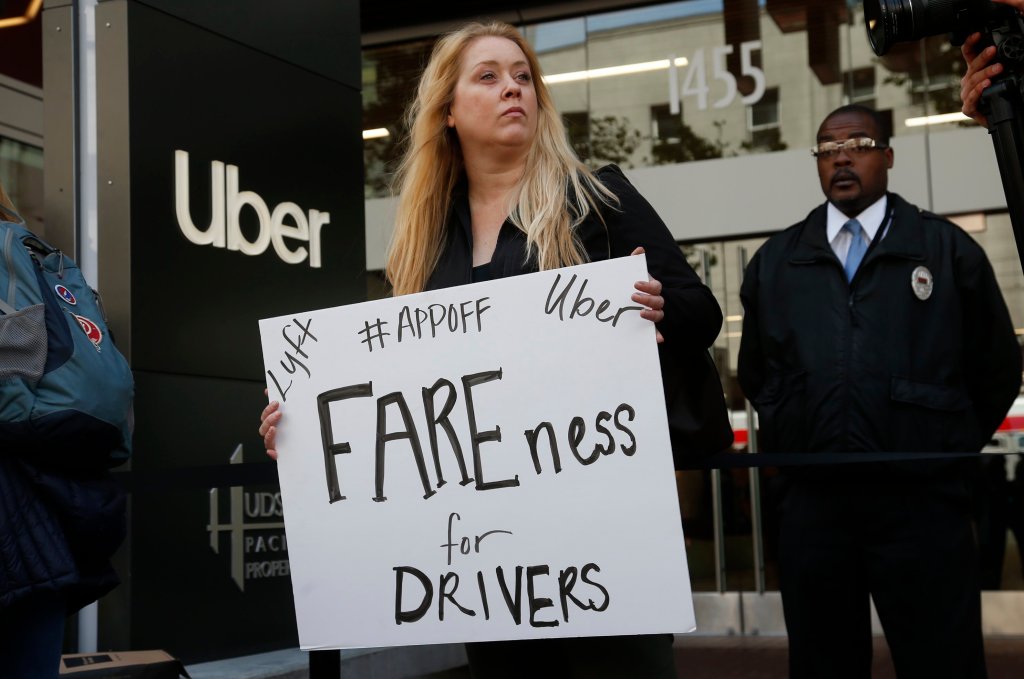Flying in the face of last year’s California Supreme Court ruling on gig-worker classification, a National Labor Relations Board memo on Uber drivers made public this week and a recent Labor Department letter make clear the Trump administration’s position: ride-hailing drivers are contractors, not employees.
Now, experts and others say, it will be up to states to provide worker protections for drivers. In California, Assemblywoman Lorena Gonzalez, D-San Diego, late last year introduced legislation that tries to codify the state Supreme Court ruling, which simplifies the standard for whether a worker should be considered an employee and is expected to put ride-hailing drivers and other gig workers in that category. Such a shift in classification would upend the business model of Uber, Lyft and other companies that rely on on-demand workers.
“This NLRB decision is just one more instance in President Trump’s growing list of attacks against workers,” Gonzalez said in an emailed statement to this news organization. “It should send a clear message to California policymakers about the lengths Trump is willing to go to decimate labor protections and keep workers in poverty, and how much is at stake” with the passage of the legislation she drafted, AB 5.
In a memo by its general counsel this week that ruled on a couple of specific cases involving Uber drivers, the NLRB said ride-hailing drivers can be “entrepreneurial” because they can boost their pay based on bonuses and incentives that Uber offers.
“Although Uber retained portions of drivers’ fares under a commission-based system that may usually support employee status, that factor is neutral here because Uber’s business model avoids the control of drivers traditionally associated with such systems and affords drivers significant entrepreneurial opportunity,” the NLRB wrote.
Beth Ross, an employment attorney in Oakland, called that “stretching the concept of ‘entrepreneurialism’ beyond reasonable bounds. The Uber drivers’ only ‘entrepreneurial’ choice is how many hours to keep the app open, which is another way of saying how many hours to sell their own labor.”
Drivers’ groups — which have protested and gone on strike over wages and benefits, especially ahead of the recent initial public offerings by ride-hailing giants Uber and Lyft — expressed dismay about the developments but said they remain hopeful.
“This is an opinion resurfaced as a favor to tech companies whose stock is tanking,” said Nicole Moore, a Lyft driver and volunteer organizer with Rideshare Drivers United in Los Angeles. The NLRB memo was dated April 16 but made public Tuesday.
Uber had its initial public offering Friday and saw its shares plunge during the first two days of trading. But they climbed higher Tuesday, after the NLRB memo’s release, and finished higher Wednesday, too, amid a broader stock market rebound — though they still remained below their IPO price of $45. Shares of Lyft had fallen 38.5 percent since that company’s IPO at the end of March, but have also risen in the past couple of days.
“This classification from the NLRB was a clear near-term victory for the likes of Uber and Lyft as this issue remains a worry for investors,” said Dan Ives, managing director for equity research at Wedbush Securities. “That said, this will be an elongated battle that will not be solved overnight with continued litigation expected from state and city governments.”
Moore pointed out that “nobody expects the Trump-appointed NLRB to be worker- or union-friendly.” She said that while drivers don’t plan to pursue unionization until there’s a change in administration, the NLRB memo “is not going to stop drivers from organizing. If anything it’s going to make us organize more.”
Rebecca Stack-Martinez, an organizer for San Francisco-based Gig Workers Rising, said, “We remain optimistic that California will continue to be a policy leader and pass legislation protecting gig workers.”
William Gould, emeritus professor at Stanford Law School and a former chief of the NLRB under President Bill Clinton, rejected the view that drivers have control over their work, as independent contractors do.
“Uber decides the amount of the fare as well the drivers’ share,” he said. “In the General Counsel’s world of make-believe, this doesn’t amount to control — and neither is control over the type of rides available, the requirement that the drivers have no substitutes and rules precluding substitute drivers as well as a requirement that the driver place an Uber decal on the car.”
Gould also cited the “Department of Labor letter excluding gig workers from wage and hour rules and the unappealable decision of the (NLRB general counsel)” in saying “the gap between rich and poor grows more and that the only protection for gig workers is in state law.”
When asked for reaction to the NLRB memo, an Uber spokesman said Wednesday: “We are focused on improving the quality and security of independent work, while preserving the flexibility drivers and couriers tell us they value.”
Lyft did not return a request for comment.










